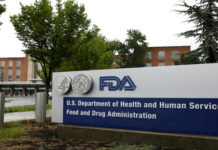“Chronic kidney disease is a significant health problem in the U.S., as the standard of care slows but does not reverse progression of the disease,” said Pablo Pergola, M.D., Ph.D., Research Director for Renal Associates PA and Clinical Associate Professor of Medicine at the University of Texas Health Science Center at San Antonio, who presented the data. “These encouraging results suggest that bardoxolone methyl has the potential to change the treatment landscape of chronic kidney disease and offer new hope for these patients and their families.”
The multi-center, randomized, double-blind clinical trial enrolled 227 CKD patients with type 2 diabetes who were randomized to receive once-daily doses of placebo or 25, 75 or 150 mg doses of bardoxolone methyl. The primary endpoint of the study was change in estimated GFR following 24 weeks of treatment.
At week 24, patients treated with bardoxolone methyl experienced a mean increase in estimated GFR of over 10 mL/min/1.72m2, compared with no change in the placebo group. Approximately three-quarters of bardoxolone methyl-treated patients experienced an improvement in eGFR of 10 percent or more, including one-quarter who saw an improvement of 50 percent or more compared to less than two percent of patients on placebo. (p<0.001). The frequency of adverse events was higher in the bardoxolone methyl group compared to the placebo group, with most events mild to moderate in severity. The most frequently reported adverse event in the bardoxolone methyl group was muscle spasm. “We are very pleased to see that bardoxolone methyl reduced the stage of disease and improved measures of kidney function in the majority of patients receiving the drug,” said Warren Huff, CEO of Reata. “We are hopeful that these results will be further validated at the end of the study, and we look forward to initiating a Phase 3 study in the first half of 2011.” “Extensive preclinical and clinical experience with bardoxolone methyl have suggested this drug holds promise as a new approach for the treatment for CKD — one that has the potential to help prevent patients from progressing to the later stages of the disease and dialysis,” said Eugene Sun, M.D., vice president, Global Pharmaceutical Development, Abbott. “We look forward to expanding our knowledge further in future studies.” About Bardoxolone Methyl Bardoxolone methyl is an antioxidant inflammation modulator (AIM) that activates Nrf2, thereby inducing the transcription of genes that decrease the level of oxidative stress and suppress important inflammatory mediators. In two Phase 2a studies, bardoxolone methyl was shown to increase measures of kidney function in patients with moderate to severe CKD and Type 2 diabetes. About Chronic Kidney Disease Chronic kidney disease (CKD) is a progressive loss of kidney function over a period of months or years, which can be caused by a number of conditions, including diabetes and high blood pressure. Diabetes is one of the leading causes of CKD. CKD is a highly prevalent condition, worldwide, with numbers expected to rise over the next decade. Available therapies modestly slow the progression of CKD, and patients ultimately progress to dialysis. About Reata Pharmaceuticals Reata Pharmaceuticals is the leader in discovering and developing novel, oral anti-inflammatory drugs that activate Nrf2, the primary regulator of cellular antioxidant and detoxification enzymes. Activation of this important biological target protects against a broad range of diseases associated with inflammation and oxidative stress. Reata is developing bardoxolone methyl, its lead product candidate, as the first disease-modifying treatment for chronic kidney disease. In January 2010, Reata and Kyowa Hakko Kirin announced a licensing agreement providing KHK with the exclusive rights to develop and commercialize bardoxolone in Japan and other selected Asian markets. In September 2010, Reata formed a strategic partnership with Abbott for the commercialization of bardoxolone in other ex-U.S. markets. Reata retains exclusive rights to bardoxolone in the U.S. For more information please visit the company’s Web site at www.reatapharma.com. About Abbott
Abbott is a global, broad-based health care company devoted to the discovery, development, manufacturing and marketing of pharmaceuticals and medical products, including nutritionals, devices and diagnostics. The company employs nearly 90,000 people and markets its products in more than 130 countries.


























